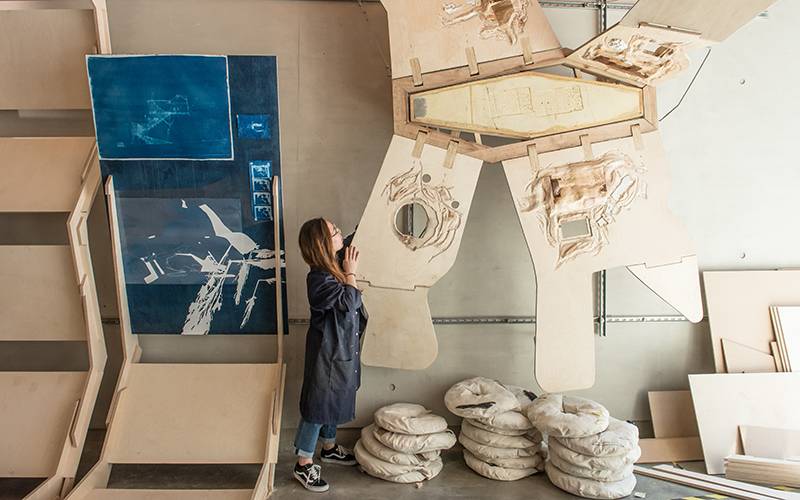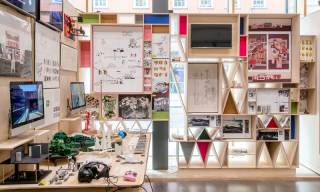This course supports students in developing robust knowledge and experience of architectural, environmental and structural design and engineering in buildings.
 About
About

This four-year programme has been designed in close collaboration with industry leaders to combine the major disciplines of architecture and engineering of the built environment and prepare graduates to be future industry leaders.
Placing creativity and design at the centre of engineering education, this multidisciplinary degree gives you the chance to understand and develop advanced design methodologies whilst becoming an expert in how they are augmented and resolved through engineering.
As a student on this programme, you’ll enjoy unrivalled spaces to work in, including new facilities at Here East, Queen Elizabeth Olympic Park, as well as centrally located departments in Bloomsbury.
“This programme reaches into subjects far beyond my first impressions of architecture. There is a space for everyone's interests to be nurtured – you just need to find your own balance within it.
Kaia Wells, Engineering & Architectural Design MEng (ARB/RIBA Part 1) student, 2020.
Historically, architecture and engineering skills were indivisible – entirely symbiotic. UCL’s new venture at Here East recognises that what are now commonly regarded as separate disciplines can in fact be brought back together, under one roof, within a unified academic programme. It is hugely encouraging.
“
Norman Foster, Founder of Foster + Partners.
Highlights
- Develop the skills to discover and grow your unique architectural and engineering vision
- Imagine, evolve, simulate and test your designs, both in the Design Studio and the Lab
- Learn how to apply advanced virtual tools and physical 3D printing to produce and test prototype designs that transform your ideas into reality
- Master leading software tools used across the global engineering and architectural industry
- Develop advanced leadership and communication to prepare you for a successful and rewarding career
As technical advances impact on the design process, component production, building site construction techniques and post-occupancy evaluation, there is an ever-growing imperative for more holistic design thinking. This programme promises to deliver new professionals set to engage with these criteria to define our future built environment.“
Ian Taylor, Managing Partner, Feilden Clegg Bradley Studios
Structure
Students complete 120 credits in each year of their degree. In the first three years these are all completed through compulsory modules.
In their fourth year, students can take 30 credits of optional modules from a variety of options, according to their particular area of interest and the specialist skills and knowledge they wish to develop in their final year of study. The remaining 90 credits are taken from two compulsory modules: Dissertation and Design Practice 3.
Modules
Year 1
Compulsory modules
- History and Theory of Engineering and Architecture (15 credits)
Module coordinator: Michael Stacey
Using London as their primary source, students are introduced to the historical, political, technical, cultural and socio-economic context of architecture and engineering. They explore the nature and processes of design, the role of the professional institution, and the development of material culture through time.
- Mathematical Modelling and Analysis I (15 credits)
Module coordinator: Matheus Oliveira De Andrade
Teaching Lead: Santosh Bhattarai
In this module students develop an understanding of the mathematical concepts that underpin the study of architectural engineering. Students apply their skills in solving practical architectural engineering problems by developing models of the engineering problem, and then simulating and analysing these models using software tools like MATLAB and Excel.
- Building Physics and Energy (15 credits)
Module coordinator: Virginia Gori
Students develop an understanding of the principles of energy-generating technologies and their impact on the environment. They carry out in-depth analysis of the impact of building envelope materials, and indoor and outdoor conditions on a building’s thermal performance. A four-day visit to the Centre for Alternative Technology in Machynlleth, Wales, allows students to explore various renewable and energy-efficient technologies.
- Building Physics and Environment (15 credits)
Module coordinator: Samuel Stamp
This module introduces students to key building physics principles of light, sound, heat and ventilation, exploring how these relate to key aspects of building design and influence the environmental performance of a space. Students work in groups on a project which demonstrates an understanding of how these features can be used within a creative design context.
- Materials Mechanics and Making (30 credits)
Module coordinator: Fabio Freddi
Through examining materials, structure and geotechnics, students gain the fundamental technical knowledge needed to design a structure from top to bottom. They develop the capacity to judge a design’s need for material that is sufficiently strong and durable, able to cope with the local climate regime and holistically sustainable.
- Design Make Information (15 credits)
Module coordinator: Klaas de Rycke
Students are introduced to the methodologies, techniques and evolving conventions of making information for the design, construction and evaluation of the built environment. Guest lecturers from recently completed projects describe the process development and approach to design information, and masterclasses taught by leading practitioners provide students with the knowledge to design make information.
- Design Make Live (15 credits)
Module coordinator: Luke Olsen
Students experience a microcosm of the construction industry by working in groups to design, prototype and test an original and innovative 1:1 project in the form of a pavilion. By inhabiting the project in some capacity, students learn first-hand the importance of good design, fabrication and assembly strategies and skills.
Year 2
Compulsory modules
- Structural and Foundation Analysis (15 credits)
Module coordinator: Fabio Freddi
Students gain an in-depth understanding of the analysis and design of structures and foundations, developing the ability to identify the best suitable solution for each design situation. They learn to investigate and analyse the behaviour of structural elements and their pros and cons, as well as the solutions needed to correct these.
- Advanced Mathematical Modelling and Analysis (15 credits)
Module coordinator: Santosh Bhattarai
This module builds upon the skills learnt in Advanced Mathematical Modelling and Analysis I, in Year 1. Students develop their understanding of the core mathematical concepts, and modelling and analysis skills that underpin the practise of engineering and architectural design. They apply these skills by developing models of an engineering problem, and then simulating and analysing these models using software tools like MATLAB and Excel.
- Urban Physics (15 credits)
Module coordinator: Ben Croxford
This module introduces students to the fundamental principles and analytical techniques used in building engineering for the local urban environment. They use modelling tools such as Computational Fluid Dynamics to inform the structural and environmental aspects of building design, and geographical information systems to extract, map and analyse urban data.
- Environmentally Responsible Building Systems (15 credits)
Module coordinator: Esfand Burman
Students are introduced to the techniques used to identify active building systems for integration within the context of a medium scale building design. They learn the techniques used to select systems, and explore issues associated with the integration of these systems. They discuss the fundamentals of sustainable building design, such as the application of heating, ventilation and cooling systems, as well as building acoustics and electrical building systems.
- Design Practice 1 (60 credits)
Module coordinator: Graeme Williamson
Design Practice 1 is the first of three extensive studio modules aimed to develop students’ skills in design, architecture and engineering synthesis. Students undertake design projects in response to a brief that is set across the whole year, through weekly tutorials and regular workshops. They investigate and identify any environmental and sustainability limitations and apply problem-solving skills to find creative solutions that are fit for purpose for all aspects of the building life-cycle.
Year 3
Compulsory modules
- Mechanics of Buildings (15 credits)
Module coordinator: Yasemin Didem-Aktas
In this module students apply advanced structural analysis methods to resolve problems relating to the structures that support real buildings. This allows them to develop their proficiency in analysing and solving building design problems from a structural viewpoint. Theoretical procedures are applied to real cases via use of numerical simulations and lab-based models.
- Sense, Sensing and Controls (15 credits)
Module coordinator: Samuel Stamp
Students design an extensive engineering solution for environmental control systems in a medium size building. This module provides them with an overview of the psychological and technical issues that underpin environmental design requirements in the context of building control strategies; principles of energy effective controls for health, comfort and wellbeing are introduced to students.
- Professional Practice and Management (15 credits)
Module coordinator: Del Hossain
Students are introduced to the professional practice of engineering and architectural design in the context of the construction industry. They explore a range of matters in business and project management, from intellectual property and copyright to professional codes of conduct and ethics.
- Making Buildings (15 credits)
Module coordinator: Yair Schwartz
In this module, students are introduced to advanced engineering techniques to evaluate ‘deconstructed’ buildings holistically. They apply reverse engineering and architectural evaluation principles to buildings in order to understand designs at varying scales and complexities. They also investigate how critical engineering matters are addressed from concept through to completion and operation.
- Design Practice 2 (60 credits)
Module coordinator: Michael Stacey
This is the second of the three Design Practice Modules that students take throughout their degree. Working in Design Units (typically a mixed group of 15 Year 3 & 4 students) they develop designs in response to a specific brief for that year. Throughout the process, students use engineering tools to augment design proposals working with advanced fabrication facilities. Students develop their ability to critically consider and identify relevant questions and challenges in the built environment, develop creative propositions, and contextualise and advocate their work as it progresses.
Year 4
Compulsory modules
- Engineering and Architecture Dissertation (30 credits)
Module coordinator: Liora Malki-Epshtein
Students develop and evidence their independent research skills through the creation and delivery of a research project, which involves a literature review, a collection, modelling and analysis of data, and an interpretation of results. Dissertations should critically examine final individual design proposals to determine the key technical issues involved.
- Design Practice 3 (60 credits)
Module coordinator: Michael Stacey
This is the final Design Practice Module that students take throughout their degree. Working in the same Design Units as the previous year, they pursue ambitious projects with increasingly complex designs, and take them forward with a greater level of testing and resolution.
Optional modules
Students can choose from modules including:
- Histories of Global London, 1900 to the Present (I)
- Engineering and International Development
- Wellbeing in Buildings: Theory and Practice
- Designing Inclusive Places
Key information
Entry requirements
Application deadline
Applications are now open for 2024 entry via UCAS. The deadline for applications is 31 January 2024.
Fees and funding
- Tuition fee information can be found on the UCL Undergraduate Prospectus
- For a comprehensive list of the funding opportunities available at UCL, including funding relevant to your nationality, please visit the Scholarships and Funding section of the UCL website.
Staff
A world-class teaching team is drawn from The Bartlett School of Architecture, the Institute for Environmental Design and Engineering (IEDE), and the Department of Civil Environmental and Geomatic Engineering (CEGE), as well as leading practitioners from across the globe.
Affiliated practices and institutes
- The programme team are very closely linked to practices and institutions:
- AKT II
- Arup
- Buro Happold
- CIBSE – Chartered Institution of Building Services Engineers
- EI – Energy Institute
- Feilden Clegg Bradley Studios
- Foster + Partners
- Hoare Lea Consulting Engineers
- ICE – Institution of Civil Engineers
- IStructE – Institution of Structural Engineers
- Laing O’Rourke
- Price & Myers
- RIBA – Royal Institution of British Architects
Accreditation
Engineering & Architectural Design MEng is accredited by the Architects Registration Board (ARB - Part 1), the Chartered Institute of Building Service Engineers (CIBSE), the Joint Board of Moderators (JBM), and full validation by the Royal Institute of British Architects (RIBA - Part 1). Engineering & Architectural Design MEng is one of the first programmes of its kind worldwide to hold accreditation from all four industry bodies responsible for the design of the built environment.
Careers
Students on this programme acquire a broad base of knowledge and skills to meet the educational and professional standards for a senior career in engineering and architecture design. The programme equips graduates with the creative engineering and architectural design skills and critical faculties that are key to solving the complex challenges of the built environment.
Contacts
Programme Director: Luke Olsen
Programme Administrator: Dan Carter
Deputy Programme Administrator: Alice Whewell
Departmental Tutor: Clara Jaschke
Programme Admissions: Daniel Ovalle Costal & Amalia Vilaplana De Miguel
Undergraduate Admissions enqueries: Complete the contact form
 Close
Close



